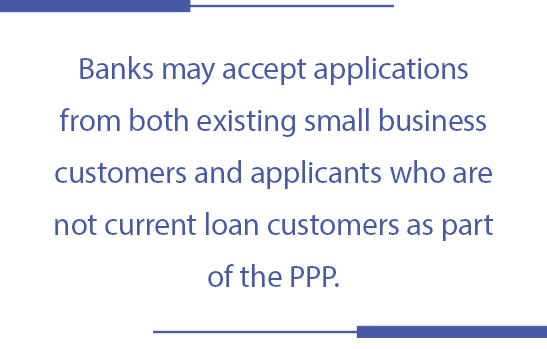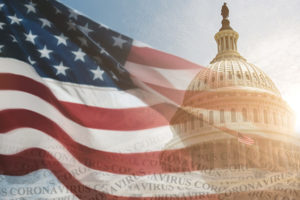By William J. Showalter, CRCM, CRP Senior Consultant, Young & Associates, Inc.
The Federal Deposit Insurance Corporation (FDIC), Federal Reserve Board (FRB), and Office of the Comptroller of the Currency (OCC) issued a “Joint Statement on CRA Consideration for Activities in Response to COVID-19” on March 9, 2020. The agencies state that they recognize the potential for the coronavirus disease, COVID-19, to adversely affect the customers and operations of financial institutions.
The OCC also issued separate pronouncements about financial institutions documenting their participation in the Small Business Administration’s (SBA) Paycheck Protection Program (PPP).
Joint CRA policy statement
Consistent with the Joint Statement on CRA Consideration for Activities in Response to COVID-19, the agencies:
- Encourage financial institutions to work with affected customers and communities, particularly those that are low- and moderate-income (LMI), and
- Clarify that they will provide favorable consideration under the Community Reinvestment Act (CRA) for certain retail banking services, retail lending activities, and community development activities related to this national emergency
Banks and thrifts have come up with many ways to continue to serve the financial needs of their communities while dealing with state stay-at-home regimes, as well as implementing prudent measures to deal with health-related concerns. Among the efforts to navigate these difficult times are:
- Closing public lobbies, while promoting use of drive-through facilities, ATMs, online banking, mobile applications, and limited lobby access by appointment
- Reducing fees and penalties related to customer deposit accounts
- Working with borrowers experiencing pandemic-related financial difficulties by modifying or extending their loans or deferring payments
- Participating in the SBA’s PPP loan program
In order to receive appropriate CRA “credit” for pandemic-related activities to assist their customers and communities, banks and thrifts should be sure to track and document what they have done, who it benefitted, and other relevant information. Extensive narratives are not necessary, but a written record that gives a good picture of what has been done should be kept.
The agencies said that the joint statement will be effective through the six-month period after the national emergency declaration is lifted, unless extended by the agencies. The FDIC’s Financial Institution Letter (FIL), with the Joint Statement attached, is available at https://www.fdic.gov/news/news/financial/2020/fil20019.html.
OCC on PPP participation
The OCC issued two bulletins in late April regarding loans made by national banks and federal savings associations under the SBA’s Paycheck Protection Program (PPP). OCC Bulletin 2020-45 rescinded and replaced 2020-44 two days later, and clarified the voluntary nature of documenting bank involvement. The OCC states that the PPP loan program is an important part of the federal COVID-19 response program for small business and may qualify for credit on behalf of banks and thrifts under the CRA.
This bulletin is directed to national banks and federal savings associations, but the information may be of interest to, and could benefit, any bank or thrift, regardless of which supervisory agency examines them.
While not requiring banks to obtain or maintain information beyond what is generated or exists in the ordinary course of business, the OCC is encouraging banks providing loans under the SBA PPP to:
- Prudently document their implementation and lending decisions, and
- Identify and track the PPP loans made to small business borrowers that have annual revenues of $1 million or less and are located in low- to moderate-income (LMI) areas

The OCC notes that banks may accept applications from both existing small business customers and applicants who are not current loan customers as part of the PPP. When working with all applicants, in addition to following the SBA PPP program requirements, national banks and thrifts are encouraged by the OCC to collect and track information provided during the application process regarding borrowers’ annual revenue, and for loans made in LMI census tracts, distressed areas, and underserved areas, and that benefit LMI individuals, families, and communities.
The agency sees maintaining and monitoring this information, where available, in the administration of the SBA PPP as a prudent banking practice consistent with the principles of safety, soundness, fair access and fair treatment of borrowers. The OCC also points out that this information may be used to track loan volumes for CRA purposes, as discussed in the Joint Statement on CRA Consideration for Activities in Response to COVID-19, discussed above.
Prudent practices may also include documenting implementation decisions when setting eligibility criteria, establishing processes for considering applications, and approving or denying PPP applications. These decisions might include issues such as the bank’s business justifications and any alternatives considered for eligibility, consideration, and approval of applications. In addition, relevant business considerations may include estimates of resources needed to implement and offer the SBA PPP, current available resources (including staff resources), and the ability to access needed information about an applicant in a timely way, among other factors.
The OCC also encourages banks and thrifts to identify and track PPP loan volumes. Such documentation enhances overall credit risk management while enabling the bank to demonstrate the full spectrum of businesses served, including small businesses and those in LMI areas. When exercising supervisory and enforcement responsibilities in this area, the OCC will take into account the unique circumstances resulting from the national emergency and good faith efforts to comply with applicable legal requirements. Documentation of these issues can help write the bank’s own story of its participation in the PPP program, and inform regulatory assessment of that involvement.
OCC Bulletin 2020-45 is available at https://www.occ.gov/news-issuances/bulletins/2020/bulletin-2020-45.html, and OCC Bulletin 2020-19 (with the Joint Statement mentioned above) may be accessed at https://www.occ.gov/news-issuances/bulletins/2020/bulletin-2020-19.html#.

William J. Showalter, CRCM, CRP is a senior consultant with Young & Associates, Inc. (www.younginc.com), with over 35 years’ experience in compliance consulting, advising and assisting financial institutions on consumer compliance and compliance management issues. He also develops and conducts compliance training programs for individual banks and their trade associations, and has authored or co-authored numerous compliance publications and articles. Bill can be reached at (330) 678-0524 or wshowalter@younginc.com.
This story appears in Issue 4 2020 of the In Touch Magazine.






